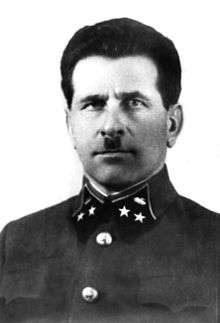Yegor Solyankin
| Yegor Solyankin | |
|---|---|
 | |
| Native name | Егор Николаевич Солянкин |
| Born |
21 April 1901 Moscow, Russian Empire |
| Died |
26 June 1941 (aged 40) near Raseiniai, Lithuanian SSR, Soviet Union |
| Service/branch | Red Army |
| Years of service | 1920–41 |
| Rank | Major general |
| Commands held | 2nd Tank Division |
| Battles/wars | |
Yegor Nikolaevich Solyankin (Russian: Егор Николаевич Солянкин; 1901–26 June 1941) was a Red Army major general. Solyankin led the 2nd Tank Division during the Battle of Raseiniai, a Soviet counterattack after the German invasion of the Soviet Union. He was killed in action during the defeat of his division.
Early life
Solyankin was born on 21 April 1901[1] in Moscow. He was orphaned at age four and was sent to be raised in a peasant family in a village in Gzhatsky Uyezd. Solyankin was a shepherd in the village. From the age of twelve he worked as a blacksmith in Moscow.[2] In June 1920, he was drafted into the Red Army.[3]
Military career
Solyankin, originally an infantryman, transferred to armor in 1932. In 1936, he served as commander of a tank battalion of the 1st Rifle Division at Kazan. From July 1938, he commanded the 2nd Tank Brigade in the Leningrad Military District.[4] Solyankin became commander of the 18th Light Tank Brigade in 1939, when it was stationed in Estonia at Uuemõisa as a result of the Soviet–Estonian Mutual Assistance Treaty,[5] and participated in the Soviet annexation of Estonia in June 1940. During the annexation, the brigade advanced into Tallinn. On 4 June 1940, he was promoted to Major General.[6] He then served as deputy commander of the 1st Mechanized Corps. Solyankin became commander of the 2nd Tank Division, part of the 3rd Mechanized Corps, on 9 December.[3][7] In the early summer of 1941 he arranged for the evacuation of the families of officers, although this was not officially permitted.[2]
World War II
During the invasion of Russia, the 3rd Mechanized Corps mounted a counterattack against the advancing XXXXI Panzer Corps in what become known as the Battle of Raseiniai. The 2nd Tank Division had marched a hundred kilometers from Kėdainiai on 23 June to make its planned assault the following day. The division had six different types of tanks, including 32 KV-1s, 19 KV-2s, and 50 T-34s. Nearly half of the KVs broke down during the march. The KV tanks and T-34s of the division surprised the troops of the 6th Panzer Division, who were unaware of the existence of the Soviet tanks. The attack caused temporary panic, but the German forces counterattacked when the 2nd Tank Division ran out of fuel and ammunition after making six attacks. The 1st Panzer Division and the 36th Infantry Division flanked Solyankin's division and its rear area was captured after the 8th Panzer Division took Kėdainiai. On 25 June, Solyankin led a breakout attempt with the remaining heavy tanks leading. The division was destroyed and Solyankin was killed on 26 June.[8][9] The location of his burial is unknown.[2] He was survived by his wife, Varvara Vasilievna, a daughter, Raisa, and a son, Alexander.[3]
Notes
- ↑ Irretrievable loss report, available online at obd-memorial.ru
- 1 2 3 Dobrovolsky, Alexander (19 May 2015). "Две любви забытого генерала" [Forgotten General had two loves]. Ohotniki (in Russian). Retrieved 11 October 2016.
- 1 2 3 "Солянкин Егор Николаевич" [Solyankin Yegor Nikolaevich]. www.pobeda1945.su (in Russian). Retrieved 2016-10-11.
- ↑ Drig, Yevgeny (4 April 2009). "2 танковый полк 2 танковая бригада" [2nd Tank Regiment 2nd Tank Brigade]. mechcorps.rkka.ru (in Russian). Archived from the original on 19 October 2012. Retrieved 11 October 2016.
- ↑ Hiio, ed. 2006, p. 17.
- ↑ Resolution No. 945 of the Council of the People's Commissars of the USSR
- ↑ Drig, Yevgeny (30 December 2007). "Биографии - С" [Biographies - S]. mechcorps.rkka.ru (in Russian). Archived from the original on 10 October 2012. Retrieved 11 October 2016.
- ↑ Maslov 1998, p. 5.
- ↑ Forczyk 2014, pp. 40–41.
References
- Forczyk, Robert (2014). Tank Warfare on the Eastern Front 1941–1942: Schwerpunkt. Barnsley, South Yorkshire: Pen & Sword. ISBN 9781781590089.
- Hiio, Toomas, ed. (2006). Estonia, 1940-1945: Reports of the Estonian International Commission for the Investigation of Crimes Against Humanity. Tallinn: Estonian International Commission for the Investigation of Crimes Against Humanity. ISBN 9789949130405.
- Maslov, Aleksander A. (1998). Fallen Soviet Generals: Soviet General Officers Killed in Battle, 1941–1945. Translated by David Glantz. London: Frank Cass. ISBN 9780714647906.